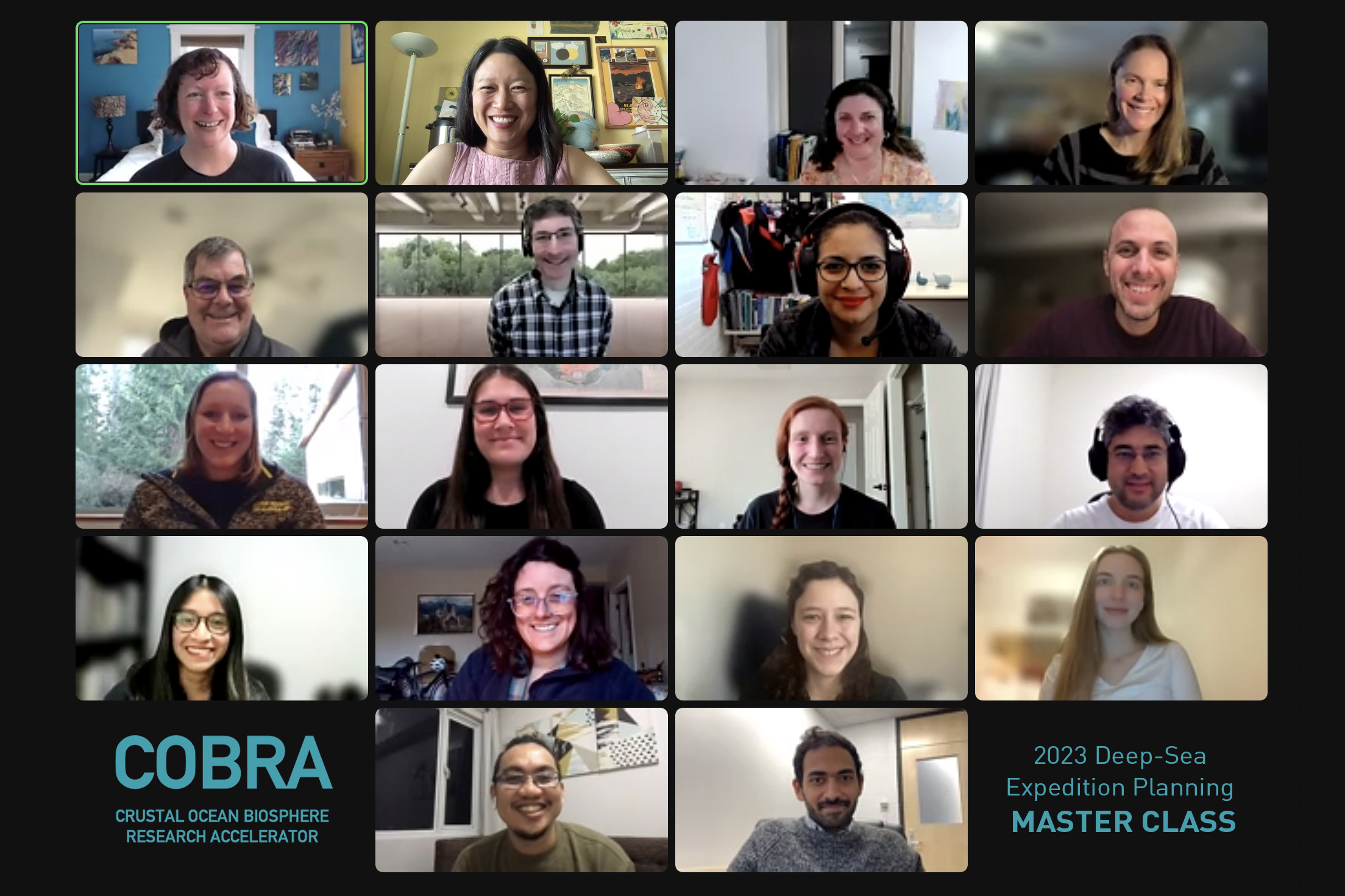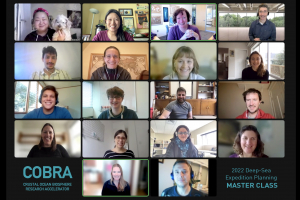Early Career Deep-Sea Expedition Leadership Master Class and Fellowship
Watch the COBRA webinar about this program
https://www.youtube.com/watch?v=lpFV4IdAiDk
Overview of the COBRA Early Career Master Class and Fellowship
The Crustal Ocean Biosphere Research Accelerator (COBRA) is an international research coordination network funded by the US National Science Foundation. COBRA’s mission is to accelerate research on the structure, function, resilience, and ecosystem services of the crustal ocean biosphere to inform decision making, particularly related to deep-sea mining and subseafloor carbon sequestration. COBRA has four primary activities to achieve this mission, as outlined in the COBRA Logic Model:
- Coordinate: Bring together diverse stakeholders to prioritize and plan research
- Accelerate: Leverage opportunities, support research exchanges, and harness data
- Translate: Bring findings to policy-makers, industry, and the public
- Educate: Train early career researchers in ocean exploration, science and policy
COBRA is an endorsed action of the United Nations’ Decade of Ocean Science for Sustainable Development.
The centerpiece of the Education activity of COBRA is a “Master Class” that trains early career researchers (ECRs) in deep-sea expedition planning from start to finish. The Master Class – delivered virtually over the course of 13 weeks – is designed to equip participants with the skills and tools to successfully design, propose, execute, and report on deep-sea oceanographic field research with a collaborative, just, equitable, diverse, and inclusive approach. Topics covered include reviewing the types of assets for conducting deep-sea research and exploration, funding and proposal writing tips, developing concepts through respectful and reciprocal engagement with others, cruise preparation how-to, at-sea operations planning, using telepresence for research and outreach, permitting and reporting, data management, and ocean law. See the COBRA Master Class website for examples of training materials. A variety of international subject matter experts provide instruction, broadening the participants’ networks. Participants apply their learning through the design of an independent project.
As an international network, COBRA seeks participation from US-based and international ECRs, with an intention to create a larger, more diverse pool of talent engaged in leading deep-sea research that addresses societal needs. In this context, an ECR is defined as a senior graduate student, postdoctoral scientist, junior faculty less than 10 years from their terminal degree, and/or other junior professionals such as an early career employee of a government, non-governmental organization/non-profit, or company.
Participants selected for the virtual Master Class training opportunity are eligible to receive a US$2,000 stipend to support their participation. Previous hands-on experience with deep-sea research, outreach, or policy is not required. Participants are considered COBRA Fellows for the calendar year and are eligible for additional COBRA leadership training opportunities.
2025 Master Class Capstone Experience aboard Falkor Too
COBRA is offering a unique invitation-only professional development opportunity in June 2025 for current and past COBRA Master Class Fellows, in collaboration with the Schmidt Ocean Institute. Select Fellows will have the opportunity to sail aboard SOI’s RV Falkor Too for one week as the vessel transits around the coast of Chile, to learn about the capabilities of the vessel during a “capstone” training experience. The training will be focused on helping participants to develop competitive proposals, to design functional cruise and collaboration plans centered in co-production of knowledge, to gain hands-on experience with managing cruise data flows and day-by-day cruise planning, and to learn about science communication. Participants will receive in-person mentoring with COBRA instructors, as well as a chance to interface with the highly experienced SOI Marine Technicians. Participants can expect to depart the experience ready to submit proposals and lead expeditions with SOI.
See the full list of Schmidt Ocean Institute’s 2025 Expeditions around the Southern Atlantic Ocean!
Future Master Classes
Sign up for the COBRA newsletter to be notified of the next COBRA Master Class opportunity.
For More Information
- Review Master Class course materials on the COBRA Master Class PubPub
- Learn about the Master Class and an initial assessment of the first Master Class published in Frontiers in Marine Science (October 6, 2023): COBRA Master Class: Providing deep-sea expedition leadership training to accelerate early career advancement
- Hear from the 2024 COBRA Fellows on the Master Class in Deep-Sea Life (DOSI/DSBS Newsletter, September 2024): Top Takeaways from the 2024 Early Career Deep-Sea Expedition Leadership Masterclasss
- Hear from the 2023 COBRA Fellows on the Master Class in Deep-Sea Life (DOSI/DSBS Newsletter, August 2023): Transferable Knowledge in Deep-Sea Expedition Leadership: Take-homes from the 2023 COBRA Master Class
- Learn about the Master Class in Deep-Sea Life (DOSI/DSBS Newsletter, January 2023): Accelerating Deep-Sea Expedition Leadership via a New COBRA Master Class
- Watch the 2022 COBRA webinar about the 2023 Master Class
2025 Master Class and Fellowship
The 2025 Master Class will be held virtually January to April 2025.
2024 Master Class and Fellowship

2023 Master Class and Fellowship

2022 Master Class and Fellowship
 The inaugural Master Class was held virtually from March to May 2022 and partnered with a telepresence-enabled deep-sea expedition of the Ocean Exploration Trust’s (OET) E/V Nautilus. This expedition was part of a series exploring seamounts within and around the Papahānuamokuākea Marine National Monument (PMNM).
The inaugural Master Class was held virtually from March to May 2022 and partnered with a telepresence-enabled deep-sea expedition of the Ocean Exploration Trust’s (OET) E/V Nautilus. This expedition was part of a series exploring seamounts within and around the Papahānuamokuākea Marine National Monument (PMNM).
